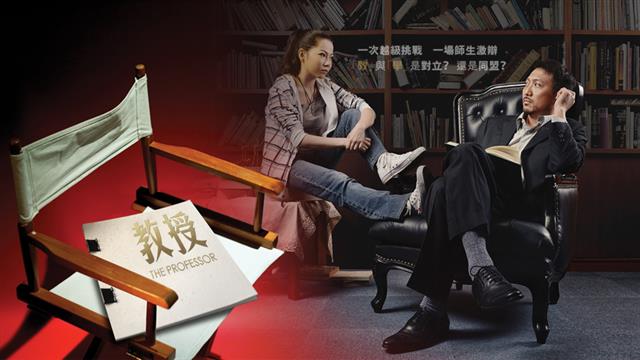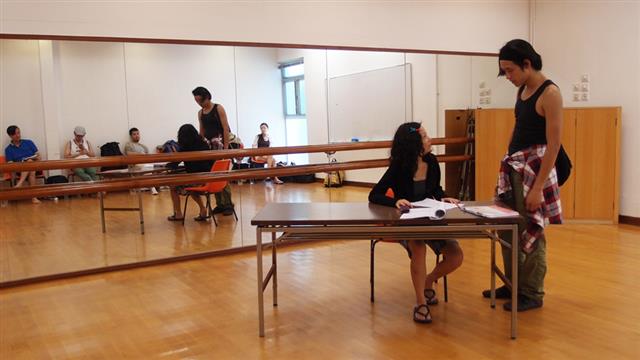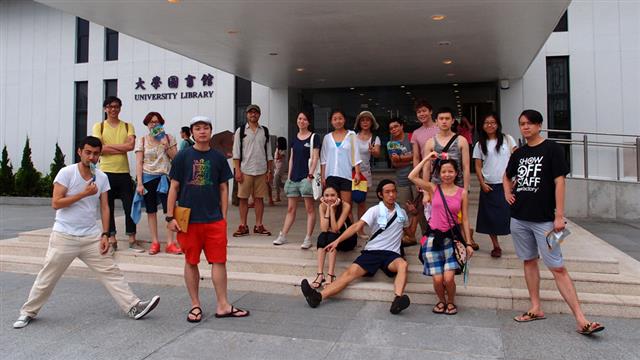A local drama production The Professor will premiere on 31 August as an exclusive presentation for celebrating the 50th anniversary of The Chinese University of Hong Kong, to be followed by more than 10 shows from 1 September. With the University as the event partner of the Hong Kong Repertory Theatre production, it is not surprising to see two CUHK alumni—Candace Chong and Octavian Chan—taking up the leading backstage roles.
Unique and Universal
Candace began to ponder what her alma mater moved her most upon receiving the theatre's commission to write a play related to its golden juiblee. 'I recalled a speech by CUHK Vice-Chancellor Prof. Joseph J.Y. Sung to the graduates I read online, which moved me to tears. It led me to reflect once again on the modesty and humanistic spirit of CUHK. Nowadays nobody bothers to remind us that education is not about income generation, or what qualities education should develop in students. This is the main reason I accepted the invitation.'
Though writing for the Chinese University, Candace made it clear that she did not want to produce something for a minority audience. She hoped to 'tell a story of universality on a CUHK platform' which not only the CUHK community but also the general audience would understand.
Thus she chose education as the subject matter. 'I'm not going to talk about great achievements or history. There may be details which strike a chord with CUHK members, but there are more with a widespread appeal, e.g., teacher-student relationship, commercialization of education, the diminishing role of Hong Kong as China's window to the outside world.'
You Are More Than What You Learn
Talking about the learning experience at the University, Candace said one usually is not aware of the impact of it until one looks back and finds how the minor bits have worked together to bring about changes. 'What did all the lectures and thesis writing have to do with my job as a playwright now? I really didn't know at the time. In retrospect, I realize that every step I made in acquiring knowledge, the research methodologies and the organization skills I learned were part of my education. The process itself has a bearing on my comprehension of different issues.' As a playwright who spends much time on research, she agrees that she would have adopted a different work style if she had entered the drama school without first studying in a comprehensive university.
Education is empowerment—Candace quoted a professor. It's not about the A plus B plus C you learn, but the endless possibilities you come to know. 'This is great! Through learning, I can open different doors which lead to different paths, and realize that there are many ways to do one thing. There were so many professors giving so many great lectures. I should have sat in on more classes. How stupid I was to have spent my time earning money by giving private tutorials!'
Octavian cherishes his undergraduate days at CUHK, too. He appreciates the professors for asking him to read extensively before lectures. 'Any discussion in physics will ultimately lead to philosophy. One must work hard to fill up the gap between the two ends. It will be a big waste if we do not fully utilize the resources and the opportunities available on campus. There are so many learned scholars. Just knock on the doors to learn more. Active learning is the most precious lesson I learned in university. Now I'm in the drama profession, I am still serious about learning.'
Strumming the Chords of Legacy
Candace heard a lot of inspiring stories when she did research for writing the play. She found that nine out of 10 alumni took pride in the strong sense of social concern of the Chinese University community and were impressed by how the University managed crises. Once she considered adding the incident of how Professor Sung reacted to the arrest of student Daisy Chan for storming a public forum. In the end she dropped the idea because she thought by not including a real case she would have a freer hand to approach the issue of student social movement. There are scenes about the debating team written from Candace's observation of the training sessions. 'The students are broadly knowledgeable. Under the coaching of veteran drama club members who made a special trip back to campus, they debated heatedly on social topics. Their discussions wouldn't change any policies in reality. But I was deeply moved by this legacy of social concern.'
Recalling how he consulted senior New Asians when he directed the College's 60th anniversary drama production Our Starlight Stories, Octavian could still feel the thrill. 'They gave me an account on how the College was founded in the impoverished days of the 1950s, how they participated in the Diaoyu Islands Movement in the 1970s, how the economy soared in the 1980s and how the 1989 student movement broke out. They also told me how they perceived the millennial generation. I began to feel how powerful the legacy has been. We are here at the Chinese University because of the selfless work of our predecessors. Can the University uphold the founding vision in this ever-changing world, or has it shifted from it? What are its struggles? I know Candace will touch upon these in her script.'
Attached Yet Detached
Though emotionally attached to the Chinese University, both Octavian and Candace are aware of the necessary detachment for making the production appealing to the general audience, and they think they have struck a balance. Candace has full confidence in Octavian. 'He's a Chinese University alumnus and knows well what I want to convey. At the same time he can also give me an alternative perspective. The interaction works well.'
Octavian views his role this way—'A director is the first audience and the re-creator of the script. Besides telling the story, he has to present the perspective of the script-writer. I'm not going to say that I can enhance it. But I'm obliged to render what moves me and strikes me to the audience, by means of theatrical techniques. The message I convey should be consistent with the playwright's. I also need to give directions to the actors regarding their interpretation because, after all, we are in the same boat.'
A drama production comes alive only after the script has interacted with the director, the actors, and most of all, the audience. For celebrating an academic institution's golden jubilee in the context of our times, what can be better than a deeply introspective play?





